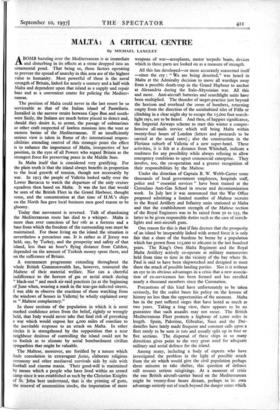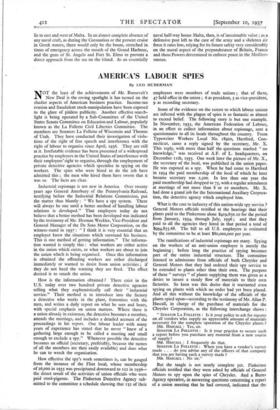MALTA: A CRITICAL CENTRE
By MICHAEL LANGLEY
A BOMB bursting over the Mediterranean is as immediate and disturbing in its effects as a stone dropped into an ornamental pond. That being so, those factors operating to prevent the spread of anarchy in this area are of the highest value to humanity. Most powerful of these is the naval strength of Britain, linked for nearly a century and a half with Malta and dependent upon that island as a supply and repair base and as a convenient centre for policing the Mediter- ranean.
The position of Malta could never in the last resort be so serviceable as that of the Italian island of Pantellaria.
Installed in the narrow straits between Cape Bon and south- west Sicily, the Italians are much better placed to detect and, should they desire it, to arrest, the passage of submarines or other craft suspected of lawless missions into the west or eastern basins of the Mediterranean. If an insufficiently serious view is taken in Rome of the international respon- sibilities attending control of this strategic point the effect is to enhance the importance of Malta, irrespective of her position, in the eyes of all Powers who regard Britain as the strongest force for preserving peace in the Middle Seas.
In Malta itself that is considered very gratifying. For the plain truth is that the island always benefits in proportion to the local growth of tension, though not necessarily by war. In 1913 the people of Valletta looked sadly over the Lower Barracca to watch the departure of the only cruiser squadron then based on Malta. It was the last that would be seen of the British Fleet in the Grand Harbour, thought some, and the concentration at that time of H.M.'s ships on the North Sea gave local business men good reason to be gloomy.
Today that movement is reversed. Talk of abandoning the Mediterranean route has died to a whisper. Malta is more than ever conscious of her role as a fortress and a base from which the freedom of the surrounding seas must be maintained. For those living on the island the situation is nevertheless a precarious one. It is rather as if Jersey was held, say, by Turkey, and the prosperity and safety of that island, less than an hour's flying distance from Calshot, depended on the amount of Turkish money spent there, and on the sufferance of Britain.
A rearmament programme extending throughout the whole British Commonwealth has, however, reassured the Maltese of their material welfare. Nor can a cheerful indifference to the horrors of gas or aerial attack during "black-out " and mock air-raid practices (as at the beginning of June when, wearing a mask in the tear-gas-infected streets, I was able to observe the reactions of those watching from the windows of houses in Valletta) be wholly explained away as "Maltese complacency."
In those sections of the population in which it is most marked confidence arises from the belief, rightly or wrongly held, that Italy would never take that final risk of provoking a war which would expose her 4,000 miles of coastline to the inevitable response to an attack on Malta. In other circles it is strengthened by the supposition that a near neighbour desirous of controlling the island could not be so foolish as to alienate by aerial bombardment civilian sympathies that might be valuable.
The Maltese, moreover, are fortified by a nature which finds consolation in extravagant festas, elaborate religious ceremony and other mediaeval survivals side by side with football and cinema mania Their good-will is maintained by means which a people who have lived within an armed camp since it was established as such by the Christian Knights of St. John best understand, that is the priming of guns, the renewal of ammunition stocks, the importation of more weapons of war—aeroplanes, motor torpedo boats, devices which in these parts are looked on as a measure of strength.
All this has developed—or more accurately reasserted itself —since the cry : "We are being deserted," was heard in Malta at the Admiralty decision to move all warships away from a possible death-trap in the Grand Harbour to anchor at Alexandria during the Italo-Abyssinian war. All this and more. Anti-aircraft batteries and searchlight units have been multiplied. The thunder of target-practice just beyond the horizon and overhead the zoom of bombers, returning empty from the direction of the uninhabited islet of Filfla or climbing in a clear night sky to escape the 15,000 foot search- light rays, are to be heard. And then, of happier significance, the Imperial Airways scheme to start this winter a compre- hensive all-mails service which will bring Malta within twenty-four hours of London (letters and postcards to be carried at the usual rates) ; also the construction in the Floriana suburb of Valletta of a new super-hotel. These activities, it is felt at a distance from Whitehall, indicate a readiness for any possibility while always refusing to allow emergency conditions to upset commercial enterprise. They involve, too, the co-operation and a greater recognition of their responsibilities by the Maltese.
Under the direction of Captain B. W. Webb-Carter some thousands of local government employees, hospitals staff, police and "essential services" have been trained at the Corradino Anti-Gas School in rescue and decontamination work. In July last it was announced that the War Office proposed admitting a limited number of Maltese recruits to the Royal Artillery and Infantry units stationed at Malta and that the establishment strength of the Maltese section of the Royal Engineers was to be raised from 50 to 155, the latter to be given responsible duties such as the care of search- lights and anti-aircraft guns.
One reason for this is that if fate decrees that the prosperity of an island be inseparably linked with armed force it is only fair that a share of the burdens be borne by a population which has grown from ii 5,000 to 260,000 in the last hundred years. The King's Own Malta Regiment and the Royal Malta Artillery actively co-operate at military manoeuvres held from time to time in the vicinity of the bay where St. Paul is said to have been shipwrecked and designed to meet there the attack of possible landing parties. Nor is it without an eye to its obvious advantages in a crisis that a new associa- tion of ex-servicemen has been formed and has enrolled nearly a thousand members since the Coronation.
Precautions of this kind have unfortunately to be taken seriously, for the realist bases his policy on the lessons of history no less than the opportunities of the moment. Malta has in the past suffered sieges that have lasted as much as two years. Taking a long view, there appears to be no guarantee that such assaults may not recur. The British Mediterranean Fleet protects a highway of 2,000 miles in length. Spain, Palestine, Gibraltar, Suez and the Dar- danelles have lately made frequent and constant calls upon a fleet rarely to be seen in lobo and usually split up in four or five sections. The dispersal of these ships in so many directions gives point to the very great need for adequate military and aerial defence for the island.
Among many, including a body of experts who have investigated the problem in the light of possible attack from the air which would give the civil population perhaps three minutes to take shelter, this question of defence still arouses serious misgivings. At a moment of crisis the one British aircraft-carrier based on the Mediterranean might be twenty-four hours distant, perhaps to its own advantage entirely out of reach beyond the danger zones which lie to east and west of Malta. In an almost complete absence of any naval craft, as during the Coronation or the present cruise in Greek waters, there would only be the boom, stretched in times of emergency across the mouth of the Grand Harbour, and the guns of St. Angelo and Fort St. Elmo to prevent a direct approach from the sea on the island. As an essentially naval half-way house Malta, then, is of inestimable value ; as a defensive post left to the care of the army and a skeleton air force it rates low, relying for its future safety very considerably on the moral aspect of the preponderance of Britain, France and those Powers determined to enforce peace in the Mediter- ranean.











































 Previous page
Previous page